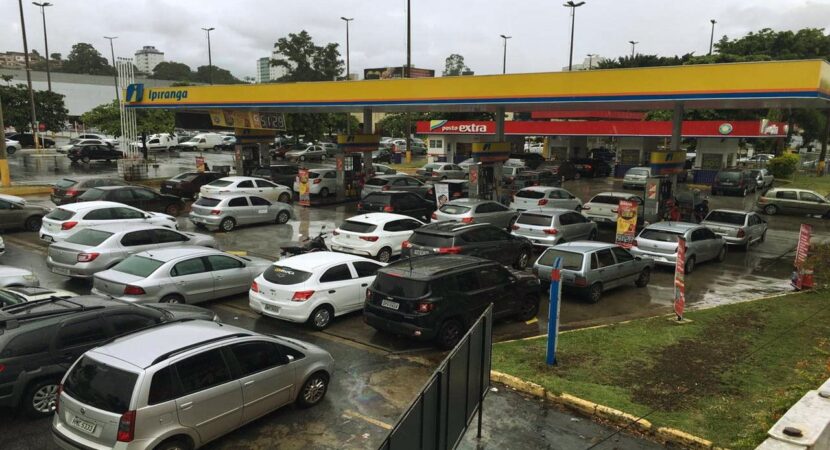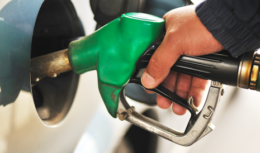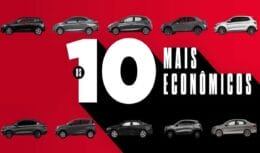
Despite the consecutive increases made by Petrobras in the price of gasoline, opting for petroleum derivatives is more economical than fueling with ethanol.
Even with the new increase in gasoline prices made by Petrobras this week, filling the tank with ethanol is no longer advantageous in all Brazilian states. Biofuel has an average national price of R$ 5,81, as shown by research by ValeCard, a company specializing in fleet management.
Read also
- After Ford announced the end of Troller in Brazil, the last unit of the T4 jeep in History is sold at R$ 300.000 and the automaker ends production in Ceará
- Just like gasoline, the price of ethanol closes September with a new high, reaching almost R$ 6 and consumers have nowhere to run
- Rise in the price of gasoline, ethanol, diesel and CNG forces consumers to abandon combustion engines, migrate to electric cars and sales of electrified vehicles skyrocket in Brazil
- Direct sale of ethanol from plants is defended by parliamentarians who promise to stimulate competition and curb the increase in gasoline prices at gas stations
Despite the recent increase in oil derivatives announced by the Brazilian state oil company, for it to be worthwhile to supply ethanol, its cost must be equivalent to up to 70% of the price of gasoline. This does not happen in any state.
In Piauí, gasoline rose by an average of 2,88% compared to the previous month, the highest increase among the country's states. The price of fuel recorded the smallest advances in Tocantins (1,14%) and in Acre (1,23%).
Among the capitals, the average value is R$ 6,37. The price champions were Teresina (PI) and Rio de Janeiro (RJ), with gasoline costing an average of R$ 6,84 and R$ 6,78 per liter, respectively. The lowest average prices were found in Macapá (AM), at R$ 5,81 per liter; and São Paulo (SP), at R$ 5,98 per liter.
The ValeCard survey was carried out between the 1st and 15th of October and took into account approximately 25 accredited posts.
Distributors warn risk of gasoline and diesel oil shortages due to Petrobras production cuts
Distributors are worried about a possible lack of fuel starting in November. Retailers say Brazilian oil giant Petrobras cut part of its gasoline and diesel supply next month, increasing the risk of shortages. According to the association of distributors Brasilcom, Petrobras — which has a monopoly on refining — took the decision unilaterally.
“Petrobras is self-sufficient in oil, but it cannot refine enough for the country's domestic consumption, therefore, distributors today try to buy from Petrobras, because it is cheaper than importing and, as it has no product to offer, is reducing future sales quotas so as not to run out of product to distributors. With this, distributors will have to import more expensively in order not to run out of product and pass on the cost to resale, thus removing the responsibility of Petrobras and the government for this possible increase to remedy the lag of Petrobras”, said Brasilcom.
Cutting fuel quotas carried out by Petrobras threatens the country with shortages. "The reductions promoted by Petrobras, which in some cases reach more than 50% of the volume requested for purchase, put the country in a potential situation of shortage", warned the Brasilcom in note.
Claim is refuted by the state. In a note, Petrobras reported that its refineries "are operating normally and continue to fully comply with contracts with distributors, in accordance with the terms and deadlines in force."
Biofuel: understand how ethanol, the newest substitute for petroleum fuels such as natural gas, gasoline and diesel, promises to change the destiny of humanity
Brazil becomes a global player when it comes to the production of ethanol and biodiesel – the biofuel that came to replace natural gas, gasoline and diesel, and promises to change the destiny of humanity. The country has become a world reference in an urgent scenario for alternatives that curb greenhouse gas emissions, the energy transition, that is, the transition from an energy matrix focused on fuels from petroleum to one with low or zero carbon emissions, based on renewable sources, is one of the biggest global focuses.
Decarbonization is a global agenda and global treaties such as the Paris Agreement and the ¨Race to Zero¨ and ¨Race to Resilience¨ campaigns, promoted by the UN (United Nations), which aim to reduce greenhouse gas emissions, such as methane and CO2, are gaining more and more engagement. The reduction of emissions will even be one of the main themes of the 26th United Nations Conference of the Parties on Climate Change (COP-26), to be held between October and November.
In this journey towards the adoption of other energy matrices, biofuel is one of the viable alternatives for various sectors of the economy. Produced from biomass, such as sugarcane and vegetable oils, or organic, residential and industrial waste, biofuel is a substitute for fossil fuels, such as natural gas, gasoline and diesel.
Brazil is one of the most advanced countries when it comes to biofuels and a world reference in the production of ethanol and biodiesel from biomass. The first is made by fermenting sucrose from agricultural vegetables such as sugar cane. Biodiesel is produced from vegetable oils (such as soy and sunflower).












